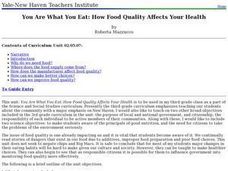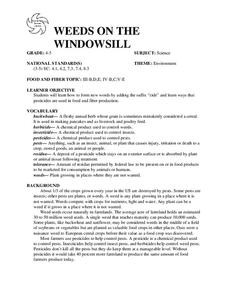Curated OER
Insects: Bug Off
Students design and conduct an experiment to test three organic pesticides to control ants. They view a video that demonstrates ant behavior and the role of pesticides in insect control. In small groups, they set up behavior...
Curated OER
WHAT'S ORGANIC?
Students explore how certain foods come to be certified "organic." They write the words "organic" and "synthetic" and given the definitions of each. Students are given dictionaries. They are asked: "What is organic food?" Students grow...
Curated OER
Environmental Health Hazards and Children
Students are introduced to the environmental hazards their community is facing. In groups, they develop a list of the ways humans have changed the Earth and how these changes have lead to environmental hazards. They record their...
Curated OER
Diet: You Are What You Eat
Third graders examine the issue of food quality to assess the dangers of pesticides, additives, and improper food preparation. After keeping food diaries and categorizing foods, they fill in food pyramids based on their journal entries....
Curated OER
Why Eat Organic?
Ninth graders explore the concept of organic eating. In this environmental stewardship lesson, 9th graders compare and contrast organic foods with conventional foods and discuss the benefits of eating organic foods.
Curated OER
Biomagnification
Students use real data to create an algebraic equation. They explain how the build up of small levels of contaminates can quickly become detrimental to species higher in the food chain.
Curated OER
I Feel Renewed!
Students participate in a simulation of the equal and unequal distribution of the earth's renewable resources. They discuss renewable resources and how food resources can increase and decrease, participate in the simulation, and analyze...
Curated OER
On The Farm
Students study a dairy farm and also the crops that grow on farms. They research how we depend on farms to get the food we eat. They transform their findings and describe one the farms or make up their own. They turn the information...
Curated OER
Track the Path of Coffee From Farm to Store Shelf
Students investigate the cultivation and marketing of coffee. In this global studies lesson, students consider the connections of the 21st century world as they explore how coffee makes it from farms to their homes. Students consider the...
Teach Engineering
The Great Pacific Garbage Patch
The Great Pacific Garbage Patch is one of several garbage patches around the world where garbage accumulates naturally. As part of a GIS unit that combines oceanography, environmental science, and life science, class members investigate...
It's About Time
Competition Among Organisms
Who knew plants could be so competitive? Join your class as they observe plants competing for space and nutrients. Middle and high schoolers describe possible effects of introducing a new species into an already established ecosystem,...
Virginia Department of Education
Changes in Ecosystems
How does water pollution affect the environment? Provide your class with the resources to answer this question as they learn about eutrophication and ecosystem changes. Over two weeks, they simulate the effects of pollution on the...
Balanced Assessment
County Concerns
Apply area concepts to help farmers and settle county disputes. Scholars use a given diagram and information about an insecticide spraying campaign to determine the monetary benefit to farmers. They then decide which of two counties has...
Curated OER
American History: Finding your Voice
Students are able to write a speech and create a slogan through analysis of current issues articles dealing with pesticide use. They put themselves in the position of one of the workers affected by the story they read.
Curated OER
The Economics of Horticultural Production
Students examine how government programs and sustainable practices can affect farm profitability. In this agriculture lesson students complete several activities that include the prices of food and designing their own ecolabel.
Curated OER
Integrated Pest Management
Students investigate the different methods used in integrated pest management. In this biology lesson, students evaluate experiments and case studies on IPM. They discuss the pros and cons of using this method.
Curated OER
WEEDS ON THE WINDOWSILL
Discuss the suffix "cide." Have students name words having this suffix (homicide, suicide, genocide). Ask students what all these words have in common. Then ask students to define the word "pesticide." (Pesticides control organisms that...
Curated OER
Finding and Measuring What You Can't See
Young scholars determine how scientists measure pollutants in food and the environment. Students discover how scientists remove one material based on its physical properties. Young scholars figure out how much of a pollutant is present...
Curated OER
Where Do You Fit In?
Students study habitats and then draw a picture of their own habitat which includes the location of food, water, and shelter, and the concept of space. then they cut their habitat in half and discuss how this would affect their lives.
Curated OER
Lead Poisoning and Ceramic Dishes
Young scholars explore the amount of lead in ceramic plates through an experiment. Students determine if everyday dishware is leaching lead into food. They chart their results and discuss how much lead in ceramic dishware may cause...
Alabama Learning Exchange
Make a Difference!
We are very dependent upon other life forms around us to survive. Here, scholars explore relationships in the ecosystem with the help of Auntie Litter and the pollution patrol. They imagine a world without grass, making connections to...
Curated OER
DNA: Expressions in Agriculture
What is DNA extraction, and can you make a living doing it? Yes, if you are in a biotechnology field. Kids learn about DNA extraction, GMOs, and biotechnology careers. They then watch videos and complete activities to understand the use...
Prince William Network
The Incredible Journey
Divide your school gym into breeding grounds and non-breeding grounds so that your zoologists can play a game simulating the seasonal migration of shorebirds. Players pick one of the included game cards and follow its directions, which...
US Environmental Protection Agency
Non-Point Source Pollution
Investigate the different types of pollution that storm drain runoff carries into oceans, lakes, rivers, and streams with this class demonstration. Using an aquarium and an assortment of everyday items that contaminants like motor oil,...

























